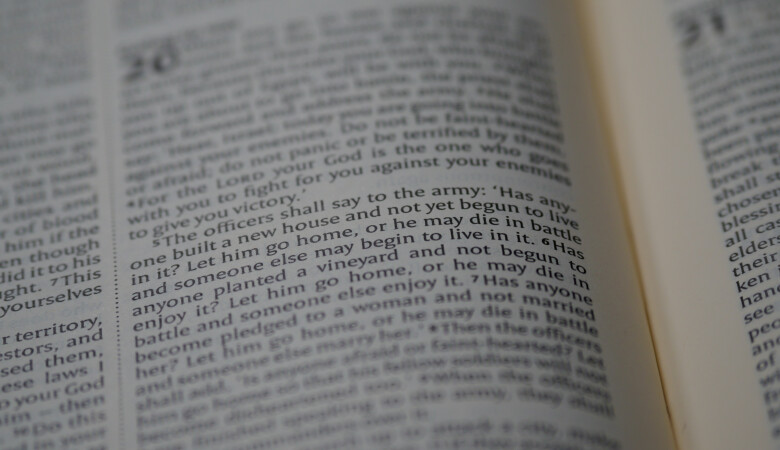The Harvest of a Lifetime: Abraham's Faith Vindicated
October 03, 2004 | Andy Davis
Genesis 22:1-24
sermon transcript
Introduction
Genesis 22 is one of the truly great chapters in the Old Testament. There is so much truth to connect to our present walk with Christ. In order not to miss any of the things that the Lord has revealed in this passage, I will preach four messages. The first two will focus on Abraham himself — the challenge of the trial for him and how his faith was vindicated. This week, we will look at the trial itself, what it was that God asked of him and how it must have been for him. Next, we will look at the mystery of God’s statement, “Now I know that you fear God” and what that means for us concerning our justifying faith and the relationship between faith and deeds. The third sermon will look at the parallels of this passage with the Gospel — what Abraham was commanded to do and what God did in his son, Jesus Christ. We will see the Gospel in prophetic typology, predictions, in how the Gospel was acted out in history. The fourth message will look at one phrase in particular and the precision of prophecy: “On the mountain of the Lord, it will be provided.”
What was the nature of the test of God in Abraham’s life? Each one of us will be tested, even most severely. A testing of our faith is essential to what God is working in each one of us. It is one of the reasons He has left us here on earth and has not taken us home, so that we might be tested as Abraham was. The tests will be small and great, light and severe, but they will all come from the hand of God, not from the devil — not because the devil attacks us, but rather because God tests us. It is my desire that when your time of testing comes, that you will shine like the sun. That you will rejoice in it, not murmur against your heavenly Father. Not wonder why He is bringing this hard thing to you but trust him the way Abraham did and rejoice in it. God will in effect be putting you on display. No one lights a lamp and puts it under a bowl, but they put it up on a stand and it gives light to everyone in the house. God wants to light you up and put you on a stand. And he often does so through these tests.
In 1849, a dusty Californian prospector came into an office and put a large yellowish rock on the countertop of a place run by a New Yorker named John Little Moffat. The prospector had sold everything that he owned and had gone west in the gold rush of 1849, and this was the fruit of his labor. He was in the assayer’s office to find out what it was. Was it genuine gold or was it fool’s gold? Moffat had developed a technique during smaller gold rushes in Georgia and North Carolina of assaying the mineral. He would weigh a precise amount, wrap it in lead foil and fire it in a furnace at 1100 degrees Celsius. Then he would remove all base materials, and reweigh the sample to declare its carat level and how much pure gold there was there. Then he would offer to strike it and mint it into gold coins worth $20 each. Those things are collectors items now because eventually they became recognized as legal tender. The quality was so high. His methodology of assaying the gold was adopted and used for over 100 years.
Abraham’s Greatest Test
Abraham Was Never Told
God will put your faith in the assayer’s fire to find out what is in there. He intends to display what He has put into you by faith, to put it on display for yourself and for the world to see. That is exactly what is going on here in Genesis 22, with Abraham’s test. We know, looking back, reading about it, what Abraham was never told, namely that this was only a test. It is helpful when we are told, “This is only a test.” But Abraham was not told that. Genesis 22:1-2 says, “After these things God tested Abraham and said to him, ‘Abraham!’ And he said, ‘Here am I.’ He said, ‘Take your son, your only son Isaac, whom you love, and go to the land of Moriah, and offer him there as a burnt offering on one of the mountains of which I shall tell you.’” The basic idea here is that God tests his children. The Hebrew word has to do with this process of assaying to find out what is in it. It is a form of revelation to uncover what the metal is. It is different than a temptation which the devil does, which entices and pulls us toward evil. Rather, God was uncovering and exposing what was genuinely in Abraham’s heart and in his faith.
God Tests His Children
The Lord does this to his children. Deuteronomy 8:2 says, “Remember how the LORD your God led you all the way in the desert these forty years, to humble you and to test you in order to know what was in your heart, whether or not you would keep his commands.” God was testing Israel to know what was in their hearts. God tests us in a variety of ways, with fire, with hardship, with difficulty such as disease, illness, the death of loved ones. But he also tests us with prosperity and praise. It says in Proverbs 27:21, “The crucible for silver and the furnace for gold, but man is tested by his praise.” What does praise do to you? Does it go to your head? Does it make you arrogant and independent from God? Or do you give it up to God and give Him the glory immediately? Praise and prosperity are forms of testing, though we identify tests for the most part as our response to harsh and negative circumstances.
Why does God test us? First and foremost, He tests us for His own glory. Trials are woven into the tapestry of redemptive history, the light and dark threads of what we consider good providence — the good things that happen, the things that are delightful to us — and also those harsher things in which we are tempted to cry out, “God, what are you doing to me?” They are woven together, not only in your life, but in the lives of all of our brothers and sisters in Christ throughout all the ages of the church. What results is a magnificent tapestry for his glory of how His children were more than conquerors through Him who loved us. God has put them on display. It is for his own glory that he tests us.
Second, God tests us to reveal His character. God delights to reveal Himself to those who will be obedient by faith in the midst of trials. He wants to put himself on display, so he tests us to demonstrate His faithfulness. God demonstrates his faithfulness and His character the most when we need Him the most, when the trial is severe. God wants to show Himself to you, and He will providentially orchestrate trials in your life to test you and to show you what He is like.
He also does it to show us what we are like, to reveal our character and our nature. Jeremiah 17:9-10 says, “The heart is deceitful above all things and beyond cure. Who can understand it? ‘I the LORD search the heart and examine the mind, to reward a man according to his conduct, according to what his deeds deserve.’” Tests come to search our hearts and reveal to us, among other things, how much evil, how much self-reliance, how much faithlessness in in there, and how much we need a Savior. How God hates our pride. It is during these testing times that we get to know ourselves and find out just how much we need Christ.
He also does it to increase our faith-filled dependence on him, so that we will rely on Him more and not on ourselves. As Paul said in 2 Corinthians 1:9, these trials have come to teach us to rely on Him “who raises the dead”, and not on ourselves. If even the Apostle Paul had to be taught that lesson, how much more do we need to learn to stop relying on ourselves and our ability and what we can do, and to teach us to rely only on God, to trust in Him, and depend on Him.
Finally, He does it to build our character, to shape us and train us for future good works. James 1:2-4 says, “Consider it pure joy, my brothers, whenever you face trials of many kinds, because you know that the testing of your faith develops perseverance. Perseverance must finish its work so that you may be mature and complete, not lacking anything.”
To make swords out of iron, the iron was heated red hot and pounded and pounded and placed back in the coals. In the coals, carbon would get on the surface, which was then pounded in. Carbon made the iron almost like a form of steel, tough and strong, able to stand up in the day of battle. In the same way, these tests and trials come to make us stronger, so we are more fit for His service. That is why God tests us.
Abraham’s Test
Abraham’s test was of a unique nature, because his life was being put up in a prophetic display. It seems the test was created for pain, especially the way God speaks to him and told him in Genesis 22:2 “Take your son, your only son, Isaac, whom you love, and go to the region of Moriah. Sacrifice him there as a burnt offering on one of the mountains I will tell you about.”
Every phrase, it seems, was designed for pain. There are times we go through trials and wonder, “Why is this trial coming into my life? What have I done, and what is happening here?” In When God Doesn't Make Sense, Dr. James Dobson relates a story about pain involving his son Ryan, who had a terrible ear infection.
Dr. Dobson writes: “Ryan had a terrible ear infection when he was three years old that kept him (and us) awake most of the night. After examining Ryan, the doctor told us that the infection had adhered itself to the eardrum and could only be treated by pulling the scab loose with a wicked little instrument. He warned that the procedure would hurt and instructed us to hold our son tightly on the table. ... I swallowed hard and wrapped my 200-pound, six-foot-two- inch frame around the toddler. It was one of the toughest moments in my career as a parent. What made it so emotional was the long mirror Ryan was facing as he lay on the examining table. This made it possible for him to look directly at me as he screamed for mercy. I really believe I was in greater agony in that moment than my terrified little boy. ... What hurt me was the look on his face. Though he was screaming and couldn’t speak, he was “talking” to me with those big blue eyes. He was saying, ‘Daddy! Why are you doing this to me? I thought you loved me. I never thought you would do anything like this! How could you? Please, please! Stop hurting me!’”
That is what the Lord endures whenever He puts us through pain. We look up and wonder, why are you doing this to me? But it had to be done. There is no way that little toddler could understand the procedure and what had to be done. The only thing for it was that it had to be done, and that Dr. Dobson had to hold him down so that he could get through it. My desire is that we would learn to not question God during that time, to not look up in the mirror and say, “God, I don’t know you anymore. I don’t know why you’re doing this to me.” Because that is the time that the devil has opportunity, when he can work to get you to question and to wonder about God.
Look at the language that God uses in Genesis 22:2: “Then God said, ‘Take your son, your only son, Isaac, whom you love, and go to the region of Moriah. Sacrifice him there as a burnt offering on one of the mountains I will tell you about.’” It seems that every phrase must have hurt more than the last one.
George Herbert in commenting on this said: “Each word was like a case of knives cutting at the patriarch’s heart.” “Take your son.” What? A father slay his own son? Would that not make Abraham a monster in his own eyes? How could he face his wife Sarah and tell her that the child born in her old age was now killed at his own hand? “Take your only son.” Oh, what a painful memory this was, because he had already been commanded to send away Ishmael. That was hard enough. Now he was to sacrifice the remaining son Isaac? The word Isaac means “laughter”, and what a flood of memories that must have brought back. It is the memories that are painful when a child dies. The memories of the laughter as Abraham, in chapter 17, fell down and laughed with joy at what God was doing, as Sarah initially laughed through unbelief, but also as she laughed with joy when she marveled at being able to give birth, and to suckle an infant at her old age.
“Whom you love.” This is a twisting of the knife. “You love him. He is a special child. You do everything together. Your heart is wrapped up in him. You cherish him. He is your only son, Isaac, whom you love. He is the focus of all your hopes and your future. He is the focus of the promises. Your only son, Isaac, whom you love…”
“And sacrifice him.” But what kind of God is commanding this? “Who are you God? Are we now like Moloch, offering up human sacrifice? How could I explain this to the pagans around as I have been preaching a holy God? How could I explain this to Abimelech, who heard about the gift of this miracle son, Isaac, and sacrifice him as a burnt offering? I do not even get to bury him. I don’t even get to touch his cold forehead. I have to watch him burn up. I have to be the one to burn him. I have to smell the smoke. How could it be more horrible?” It seemed every phrase was designed for pain. The real test seemed to be, who was God, that He was commanding this?
A Mature Test for a Mature Faith
This was, brothers and sisters, a mature test for a mature faith. This was at the highest level. God had been preparing our patriarch, our father in faith, Abraham, for it for his whole lifetime. It was not a beginner test but an advanced test — in some respects a final test, a final exam, and a step-by-step preparation. Genesis 22:1 (ESV) says, “After these things God tested Abraham…” After what things? After, perhaps, the immediate events of Chapter 21, but I think after a lifetime of these things, after all of the shaping that God had done in Abraham’s life.
Charles Spurgeon said, “The great test came after nine great trials, each of them most searching and remarkable. After he had passed through a great fight of affliction, and had through the process been strengthened and sanctified, he was called to endure a still sterner test. From which fact it is well to learn that God doth not put heavy burdens upon weak shoulders, and he doth not allot ordeals fit only for full-grown men to those who are but babes, he educates our faith, testing it by trials which increase little by little in proportion as our faith has increased. He only expects us to do man’s work and to endure man’s afflictions, when we have passed through the childhood state, and have arrived at the stature of men in Christ Jesus. Expect then, beloved, your trials to multiply as you proceed towards heaven. Do not think that as you grow in grace the path will become smoother beneath your feet, and the heavens serener above your heads. On the contrary, reckon that as God gives you greater skill as a soldier, he will send you upon more arduous enterprises; and as he more fully fits your bark to brave the tempest and the storm, so will he send you out upon more boisterous seas, and upon longer voyages, that you may honor him, and still further increase in holy confidence. You would have thought that Abraham had now come to the land Beulah, that in his old age, after the birth of Isaac, and especially after the expulsion of Ishmael, he would have had a time of perfect rest. Let this warn us that we are never to reckon upon rest from tribulation this side the grave.”
It could be that your most severe test awaits your death bed, that God will step by step prepare you to give glory to him by the way you pass out of this world. I do not know, but He is shaping and preparing each one of His children by means of these wise tests. We see it in Abraham, through his original call from Ur of the Chaldees, through years of calling upon the name of the Lord, and through 25 years of waiting for this promised child. He had many ups and downs: weak moments — sins with Pharaoh and Hagar and Abimelech — and spectacular revelations from God — the night under the starry skies, when God made him a promise with a magnificent and mysterious covenant cutting ceremony, the command for circumcision, the birth of Isaac, the promised one. It could be that through all of that, Abraham’s heart had gotten so wrapped up in this little boy Isaac that he could not let him go.
Later in the Genesis account, Jacob loved a woman named Rachel, but he was swindled and had to marry her sister. He cherished the child Joseph that Rachel finally gave birth to. Later she died giving birth to Benjamin, and then Joseph was cruelly taken away from him. Jacob believed that Joseph was dead, and all he had left was little Benjamin. Judah testified to this unknown Egyptian leader who was Joseph that Judah’s father’s heart was wrapped up with the boy Benjamin, and if he died, his father will die. Judah begged Joseph not to bring his father’s gray head down to the grave in grief and sorrow. It may be that Abraham had the same kind of affection for Isaac.
Tested to the Uttermost
God tested Abraham to the uttermost. He was to take a three days’ journey — not three hours, but three days of thinking about this, step-by step going to the region of Moriah, and every step, increasing pain. The text highlights their togetherness. Genesis 22:6-8 says, “And Abraham took the wood of the burnt offering and laid it on Isaac his son. And he took in his hand the fire and the knife. So they went both of them together. And Isaac said to his father Abraham, ‘My father!’ And he said, ‘Here am I, my son.’ He said, ‘Behold, the fire and the wood, but where is the lamb for a burnt offering?’ Abraham said, ‘God will provide for himself the lamb for a burnt offering, my son.’ So they went both of them together.”
God waited until the last possible moment to stop the test. God did not call it off and congratulate Abraham after one day. No — one, two, three days, up the mountain, the conversation, the whole thing. Abraham built the altar, bound his son and lay him on it. He went right to the end, reaching for the knife. Perhaps even as he was starting to move it toward his son, Isaac, then and only then did God stop him.
Abraham’s Obedience
Immediate Obedience
First, Abraham exhibited faith-filled total obedience. First, it was immediate obedience, no hesitation. Genesis 22:3 says, “Early the next morning Abraham got up and saddled his donkey. He took with him two of his servants and his son Isaac. When he had cut enough wood for the burnt offering, he set out for the place God had told him about.”
I have heard, “To delay is to disobey.” We are called on to obey immediately when God tells us to do something. Abraham was immediate and prompt in his obedience. He did not linger or meditate and say, “Lord, let me pray about this.” Not that he did not pray, but there is no prayer in the text, he just did what he was commanded to do, and he certainly did not complain or murmur. It does not say whether he told Sarah what he was doing — that would have been quite a conversation — but the text is silent about that encounter, if it ever happened. Immediate obedience.
Faith-filled Obedience
Second, we see faith-filled obedience. This is key because his obedience is based upon a lifetime of hearing God speak to him. Faith does not come out of nowhere. Romans 10:17 says, “So faith comes from hearing, and hearing through the word of Christ.” Faith comes from hearing the word. If you want greater, stronger faith, hear the word more.
I extracted all of the direct quotes from God to Abraham in the Scripture and put them on one sheet. It came out to 1133 words in the English translation I was looking at. Over a thousand words. Page after page. I then categorized them into 19 separate commands, 12 statements, two questions, and 40 promises. God had given him a river of revelation. This is faith-filled obedience based on hearing God speak to him again and again.
Practiced Obedience
Third, it was practiced obedience based on habit. Abraham had obeyed every one of those 19 commands. God commanded: “Leave your country, your people and your father's household and go to the land I will show you.” Abraham obeyed. God commanded, “Bring me a heifer, a goat and a ram, each three years old, along with a dove and a young pigeon.” Abraham brought that whole list of things.
God commanded, “No longer shall your name be Abram, but it shall be Abraham.” Abraham changed his name. He commanded concerning his wife, “No longer shall your wife’s name be Sarai but Sarah.” Her name was changed. God commanded, “Every male among you, including you shall be circumcised.” Abraham obeyed and was circumcised. God commanded, “Send away the slave woman and her son.” Abraham obeyed and sent them away, though it hurt him deeply. Abraham had established a pattern of obedience. This is how God gets you ready for your trial: you do what He tells you to do.
Reasoned Obedience
It was reasoned obedience. He used his rational capacity, his logic. Some people think of faith and reason as diametrically opposed. Richard Dawkins, an evolutionary scientist, likens religion to an infectious virus that readily replicates by spreading falsehoods, which is what he says faith is. He embraces science and human reason, and paints religion as an evil virus. He would say, “Faith is irrational, illogical, unreasonable.”
But that is not true. Abraham took as a basic starting point that there is a God who created Heaven and earth, and then had an experience of hearing God speak his word to him again and again, and his word proved true again and again. He predicted something that no one could ever have seen, a child born to him in his old age, 100 years old, and Sarah whose womb was dead, 90 years old. God had proven trustworthy. Furthermore, God made specific promises to him concerning the boy, Isaac. He said to Abraham in Genesis 17:19 “…your wife Sarah will bear you a son, and you will call him Isaac. I will establish my covenant with him as an everlasting covenant for his descendants after him.”
Genesis 21:12: “But God said to him, ‘…it is through Isaac that your offspring will be reckoned.’ [Next, he weighed God’s command] ‘Take your son, your only son Isaac, whom you love, and go to the land of Moriah, and offer him there as a burnt offering on one of the mountains of which I shall tell you.’” Abraham thought, “How will I reconcile these things?” Hebrews 11:17-19 tells us how: “By faith Abraham, when God tested him, offered Isaac as a sacrifice. He who had received the promises was about to sacrifice his one and only son, even though God had said to him, ‘It is through Isaac that your offspring will be reckoned.’ Abraham reasoned that God could raise the dead, and figuratively speaking, he did receive Isaac back from death.” Faith and reason were working together in Abraham’s life. He reasoned from the basis of faith promises, but it was a rational process.
The NIV gives an incorrect impression in Hebrews 11:18 concerning Abraham: “He who had received the promises was about to sacrifice his one and only son, even though God had said to him, ‘It is through Isaac that your offspring will be reckoned.’” The Greek does not say “even though.” No other translation says “even though.” The NIV adds it in because it does not otherwise make sense to our modern ears. But to Abraham, it made perfect sense. The only way he would do it was if God had given him a promise already concerning Isaac. If there had been no promise that through one of his offspring, all peoples on earth would be blessed, and Isaac had not been specified, then the test would have been tough — he would have no basis for thinking that God would raise Isaac from the dead. He would fear that he might lose him forever. Instead, he reasoned that Isaac was the child of promise. God had said so. The only thing that made sense is that God would raise him from the dead.
Never let anyone tell you that faith and reason are enemies. They are not. They are good friends and they work together. But faith-filled people accept more data and more information than unbelievers do. We accept the Word of God, and we reason out based on that. So Abraham’s faith was a reasonable faith.
Total Obedience
Finally, Abraham displayed total obedience, right to the uttermost. In verses 9-10, “When they reached the place God had told him about, Abraham built an altar there and arranged the wood on it. He bound his son Isaac and laid him on the altar, on top of the wood. Then he reached out his hand and took the knife to slay his son.” We see, in the obedience of Abraham, a pattern of Christ, although not perfect. Jesus said in John 17:4, praying to his heavenly Father, “I have brought you glory on earth by completing the work you gave me to do.” Jesus is the only human being that ever can say, “I did everything you wanted me to do, Father.” But in this case, Abraham is a pattern of total obedience.
We see immediate, faith-filled, practical, habitual, reasoned, total obedience. As a result, we see God’s commendation, which we will cover in the next sermon. Verses 11-12 say, “But the angel of the LORD called out to him from heaven, ‘Abraham! Abraham!’ ‘Here I am,’ he replied. ‘Do not lay a hand on the boy,’ he said. ‘Do not do anything to him. Now I know that you fear God, because you have not withheld from me your son, your only son.’” This an incredible mystery, this statement, “Now I know that you fear God.” The omniscient, all-seeing one who says all the days of your life are written in his book before one of them came to be, is saying, “Now, I know that you fear God.” We will, God willing, plumb the depths of that statement.
Timeless Lessons and Applications
God Tests Faith
If you are a child of God, He will test your faith. He will bring hard things in your life to test you with pain, with suffering, with setbacks, with sickness, and with the death of loved ones. He will also test you with praise and prosperity and success. He will test you in many ways. He does it for His own glory and for your good. The question is, how will you respond?
One of my seminary professors told me of a family that was in the church that he pastored, a loving, godly Christian family. They had three children, and each one of their children was taken from them in three separate incidents over two years. Stop and think what that would feel like. No children left, all of them gone separately in two accidents and one terminal illness. At the funeral, they sang at the family’s request How Firm a Foundation. The final line says, “The soul that on Jesus has leaned for repose, I will not, I will not, desert to his foes. That soul, though all hell should endeavor to shake, I’ll never, no never, no never forsake.” They put a child’s name under each “Never”. They were trusting in God to get them through the most severe trial they had ever faced in their lives. They knew the faithfulness of God, while at the same time they knew the pain that that trial alone can bring.
Are you ready to trust God through the trials he has in mind for you? Some of you have already been through great trials. God may still have more in store for you. But you should testify to those who have yet to go through it that God has been faithful to you.
Some of you are going through trials now. Trust in Him. Please do not murmur. In church history, human suffering has been an open door to bring bad theology into the church. “Because I lost my wife, I lost my son, I went through this suffering, therefore God is not sovereign, or does not care,” or some other charge. Do not deny in the dark what you learned in the light. Trust Him in those times.
Worship
One final word about the nature of worship. Verse 5 says, “He said to his servants, ‘Stay here with the donkey while I and the boy go over there. We will worship and then we will come back to you.’” “We will come back to you” — that is his testimony of faith.
Before that he said, “We will worship.” I meditated on that for a long time. In our Wednesday night class we are studying worship. It is interesting to talk about “worship wars” in various congregations regarding music styles. Do you realize how much greater and bigger worship is than all of that? In effect, Abraham looked on the sacrifice of his own son as worship. God is saying, in the same way that he did with Abraham, “He who did not spare His own son, but gave Him up for us all — how will he not also, along with us, graciously give us all things?” That is God’s stance toward you if you are a Christian, because you have faith in Christ, that everything that He has is yours. He will give it to you. The question is, what is your stance toward God? Can you say back to God the same thing He is saying to you in Christ?
Can you come to Him on Sunday morning and seven days a week and say, “God, all I have is yours. I will not withhold Isaac, I will not withhold anything — my body, my time, my money, my children.” Jesus said beautifully in John 17:10, praying to his Father, “All I have is yours, and all you have is mine.” Is that your stance in worship? My desire is that we would be purified and strengthened and be true worshipers, able to offer to God a living sacrifice, holy and pleasing to him every day, and lay down whatever Isaacs he calls on us to lay down, all of them, on the altar.






























